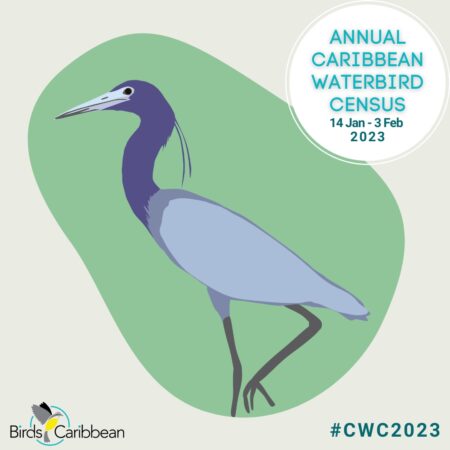
This year we have featured seven waterbirds in our Caribbean Water Census graphic! Find out more about each of these beautiful birds in our blog posts and on social media.
Today is the last day of #CWC2023 and our featured waterbird helped Jerome Foster win third place in our Global Big Day Photo Contest back in 2021. This handsome bird, the Little Blue Heron, can be blue-gray, white, or something in between.
The Little Blue Heron is a small heron with a slender neck and long legs. It has rounded wings with a long straight bill. Adults have a rich purple-maroon head and neck and dark slaty-blue body, yellow eyes, greenish or dark legs, and a bill that is pale blue at the base and black at the tip. They may be mistaken for the Tricolored Heron but lack the white on their neck and belly. Juveniles are entirely white with yellowish legs, and immatures molting into adults have both white and blue-gray plumage as seen in the photo captured by Jerome (see our gallery below).
If you’re heading to your local estuary, mangrove, salt pond, or swamp for this year’s Caribbean Waterbird Census (CWC) keep an eye out for these birds. Here they forage for fish, grasshoppers, dragonflies, crabs, and shrimps. And unlike the Tricolored Heron which uses a variety of tactics to capture prey, the Little Blue Heron is a stand-and-wait predator. This means they stand and look, watching the water for prey, or walk slowly.
They are more frenetic, however, when it comes to defending food or nesting sites, actually chasing and attacking other Little Blue Herons, by striking and jabbing at each other with their bills.
Like all waterbirds, Little Blue Herons are vulnerable to pollution and risk eating prey contaminated with pesticides and heavy metals. They will also abandon nests, eggs, and chicks if disturbed by humans resulting in low breeding success.
We would love to know if you spotted any Little Blue Herons, with their moody hues of blue and purple, during your #CWC2023. Don’t forget to tag us in your photos and more importantly add them to your eBird Caribbean checklists!
CWC 2023 starts on Saturday January 14th and runs through Friday February 3rd. See below for detailed instructions and free downloadable resources to help you make the most of your waterbird counts and don’t forget to keep an eye out for Piping Plovers!












